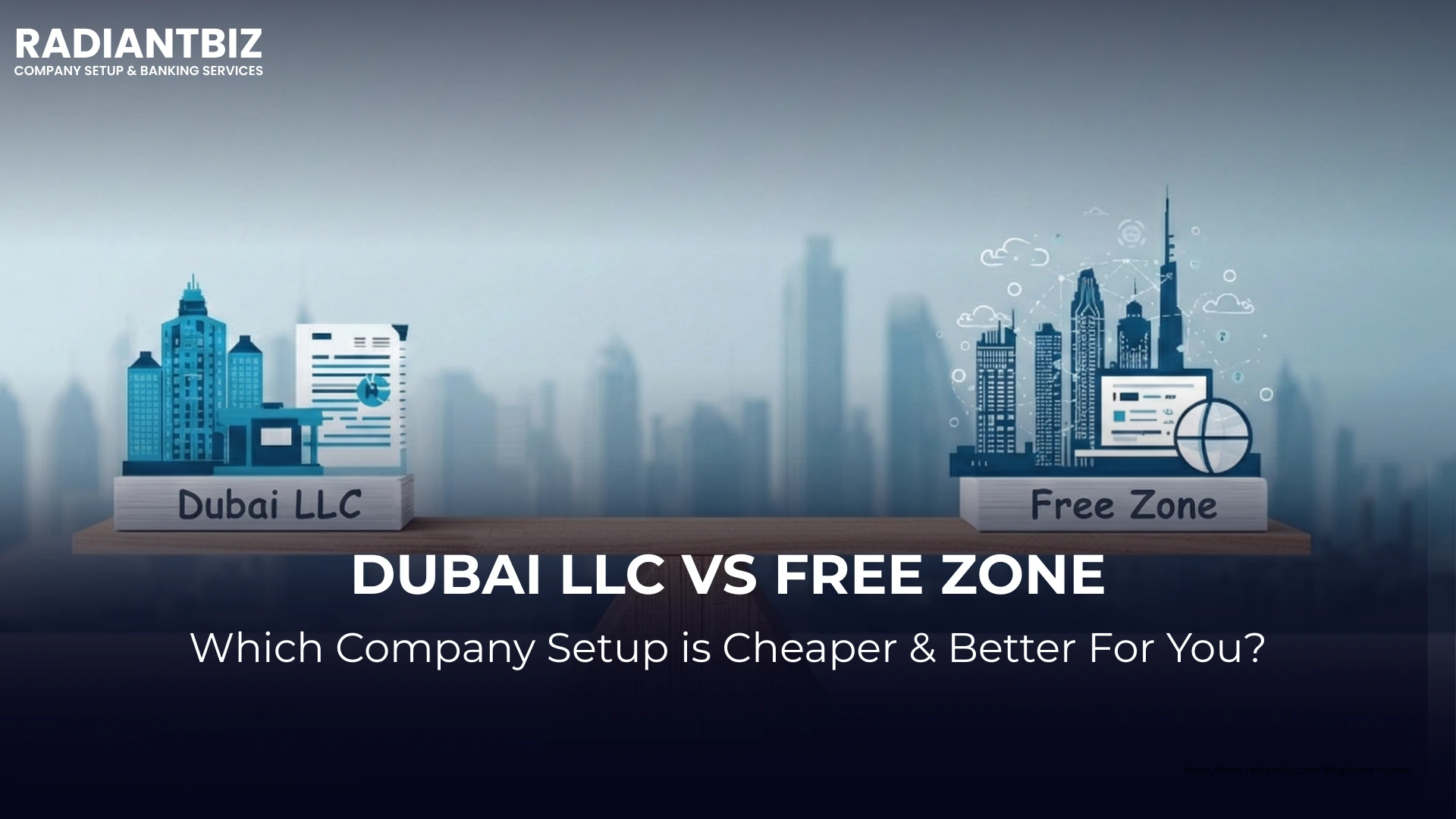Permissible Business Activities for Offshore Companies in Dubai


Table of Contents
Dubai has established itself as a business center for the world, attracting entrepreneurs, companies, and investors from all over the globe. Among numerous choices for a business setup in the UAE, offshore businesses still have a unique combination of tax effectiveness, confidentiality, and management simplicity.
However, despite the popularity of the offshore, there is still great uncertainty as to what these companies are legally allowed to do. This piece provides an in-depth summary of what Dubai offshore companies can and cannot do, putting to rest myths and allowing investors to make more informed decisions.
What is an Offshore Company in Dubai?
To start with, an offshore company in Dubai is a legal business entity licensed in one of the UAE’s offshore jurisdictions. It is primarily designed for conducting business outside the country. These companies cannot trade within the UAE, cannot issue residence visas, and are not required to maintain a physical office space. This structure is ideal for businesses that wish to manage operations in international markets while benefiting from Dubai’s reputation, infrastructure, and business-friendly environment.
Jurisdictions for Offshore Company Licensing
There are three main jurisdictions in the UAE for offshore company licensing, i.e., Jebel Ali Free Zone Authority (JAFZA Offshore), Ras Al Khaimah International Corporate Centre (RAK ICC), and Ajman Offshore.
Each of these authorities has various benefits. JAFZA Offshore is the only authority that provides offshore companies with property rights in designated areas of Dubai. RAK ICC is favored due to its strong legal framework and ease of international structuring, while Ajman Offshore is favored by small businesses due to its cost-effective setup and easy process.
Key Advantages of Offshore Companies
The advantages of establishing an offshore company in Dubai are many. The companies offer full foreign ownership, absence of corporate and income tax, full repatriation of profit, and high levels of privacy. There is no local shareholder or sponsor required, nor heavy administrative costs when compared to mainland or free zone companies. Moreover, offshore companies can avail UAE's well-established banking system, a primary requirement for engaging in international trade and global financial operations.
Regulatory Compliance and Oversight
Offshore companies operate under strict guidelines established by their jurisdiction of origin. Policies are tailored as per global standard procedures such as Anti-Money Laundering (AML) regulations, Common Reporting Standards (CRS), and Ultimate Beneficial Ownership (UBO) regulations for information disclosure. An official agent operates to assist firm owners by means of compliance, licensing, and everyday governance and ensures everything stays within the law.
Permitted Business Activities
Holding and Investment
Its most common and straightforward use is in holding and investment activities. Offshore companies can hold foreign company shares, intellectual properties such as trademarks or patents, investment portfolios, and even own joint ventures. International investors often use offshore companies as holding vehicles for foreign real estate, private equity, or share holdings outside the UAE.
Consulting and Advisory Services
Consulting and advisory services are also included in the permitted activities, provided that they are offered to clients outside the UAE. Whether it is IT consulting, business strategy, or creative consultancy, one can utilize offshore companies to bill international clients for remotely performed services.
International Trade
Trading is another significant sector. Offshore firms may engage in international trade, acting as a middleman between buyers and sellers in other nations. It is worth noting, however, that these firms are not allowed to import or export directly to and from the UAE as this would entail a mainland or free zone license.
Shipping and Maritime Operations
Both shipping and maritime businesses also embrace offshore involvement in companies. Various global shipping firms make use of offshore vehicles to license ships, manage cargo logistics, and administer charter agreements.
Asset Protection and Wealth Management
Family offices and high-net-worth individuals often use such structures to protect global assets, implement succession, and manage trusts or foundations. The discretion and flexibility offered by offshore jurisdictions make them useful tools for maintaining intergenerational wealth.
Intellectual Property (IP) Licensing
An offshore company can be used to centralize ownership of patents, trademarks, and copyrights and then license such IP to subsidiaries or companies worldwide. The licensing arrangements generate royalty income, which can be received by the offshore company in a tax-efficient way.
Remote Professional Services
A number of professionals who work in online industries, such as web developers, software programmers, digital marketers, and content developers, also utilize offshore companies to offer remote services to global clients. As long as these clients are not UAE-based, the company is fully in line with offshore company laws.
Restricted Activities and Limitations
No Local UAE Business Operations
Offshore companies are barred from engaging in any form of business activity in the UAE. They cannot distribute products or sell services to consumers in the UAE, lease offices for commercial purposes, or make a physical commercial presence in the Emirates. A distinct onshore or free zone license must subsidize any such action.
No Visa Sponsorship
Work is also an area of limitation. Offshore companies cannot sponsor visas for directors, shareholders, or employees. This is a big limitation for investors who want to relocate to the UAE or hire locals.
Forbidden Financial Services
Offshore companies cannot engage in regulated activities like banking, insurance, and financial services. These sectors are under regulation by government authorities such as the Central Bank of the UAE, Securities and Commodities Authority (SCA), and the Dubai Financial Services Authority (DFSA).
Real Estate Restrictions
While JAFZA Offshore companies can own property in approved freehold areas of Dubai, RAK ICC, and Ajman Offshore companies may need to set up a special purpose vehicle (SPV) or work through additional structuring to invest in property. Even when property ownership is allowed, offshore companies cannot engage in real estate brokerage, development, or construction activities.
Banking and Financial Access
Banking remains a big advantage for offshore businesses, even if it is not always straightforward to get a corporate account. UAE banks conduct rigorous due diligence, including UBO checks, justification of business purpose, and the occasional personal interview. However, successful applicants enjoy the advantage of multi-currency accounts, international money transfers, and secure online banking facilities tailored to international businesses.
Corporate Tax and Economic Substance Regulations
Corporate Tax Exemption
Although the UAE has implemented a 9% corporate tax in 2023, this is only for companies earning more than AED 375,000 and operating within the UAE. Offshore companies are exempted as long as their income is completely foreign-sourced.
Economic Substance Requirements
Certain business activities can initiate Economic Substance Regulations (ESR). These include, among others, IP-related businesses, holding companies with assets generating revenue, and financial service activities. Offshore entities engaged in such activities must establish adequate economic presence or incur penalties.
UBO Declarations and Transparency
Transparency and compliance are no longer optional. Offshore hubs in the UAE have caught up with global standards of financial integrity. Disclosure of UBOs, filing of annual returns, and maintenance of proper books of account are requirements. This guarantees the genuineness of their business and simplifies banking, tax, and business associate interactions.
Use Cases in Action
At a glance, let us consider some examples. An investor from India would establish a JAFZA offshore company in order to buy rental property within Dubai and administer the income of the same outside the country. A UK consulting marketing professional can use a RAK ICC company to market towards clients in Europe, avoiding taxation while keeping itself confidential. An IT startup company can use an Ajman offshore company for licensing its proprietary software to offshore partners and achieving royalty income profitably.
Strategic Benefits and International Positioning
The strategic advantages of an offshore base in Dubai are self-evident. Firms benefit from international prestige, time zone advantage, and the convenience of doing business. Complete foreign ownership, no taxation, and low operational expenses make a strong case for global entrepreneurs.
Challenges and Dynamic Compliance
Yet, it is imperative to remain aware of the increasing regulations. With changing global norms under regimes like BEPS, FATCA, and CRS, offshore businesses must not only remain compliant but also look ahead. Increasing innovation in financial regulations, digital infrastructure, and worldwide taxation policies will continue to impact the offshore ecosystem in Dubai.
The Future of Offshore Companies in Dubai
Looking ahead, Dubai’s offshore sector is expected to evolve with hybrid models that merge offshore benefits with free zone flexibility. There is growing interest in creating structures that support digital asset holding and facilitate smoother international licensing arrangements. These innovations will position the UAE even more strongly as a preferred base for international business structuring.
Dubai offshore companies can be great tools for channeling foreign investments, commerce, and wealth. While prohibited from operating in the UAE, the variety of permitted global activities makes them highly beneficial to companies not reliant on a domestic market. Through careful planning, effort, and expert guidance, a Dubai offshore company can be a gateway to global markets and long-term financial success.
Seek our professional on-the-ground guidance, contact us via mail at info@radiantbiz.com or WhatsApp & call us at+971 55 234 7124!



2.png)




.avif)